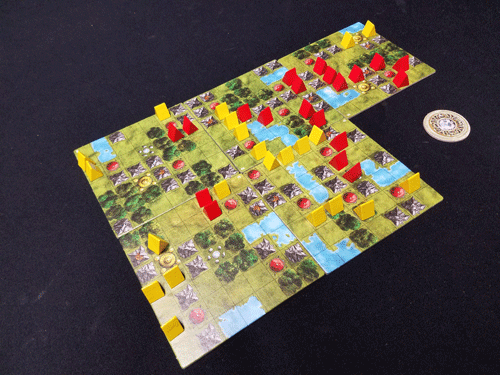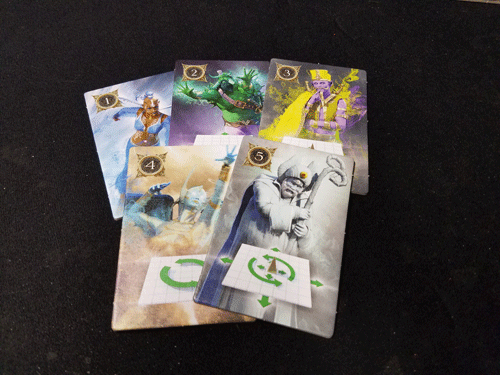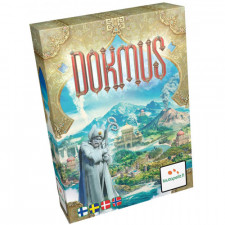Dokmus Review
on Feb 14, 2017
In Dokmus, the players lead various tribes to a once-forgotten island. There, they will conquer temples and placate the island’s guardians to make use of powerful abilities. Only the strongest tribe will triumph. Or, at least, that’s what the rules say. In truth, there is very little of that going on and the title is almost purely abstract.
Players begin with 24 tokens. Each round, they’ll place three. In general, they can only place them next to pre-existing tokens. Sometimes, players might have to sacrifice one of their tokens for the turn when moving onto a volcano or into a new forest. After eight turns, all the tokens have been placed and its time to score.

Quite possibly the most generic board game picture of all time.
At game end, each pyramid placed on an ancient ruin is worth one point, a small temple, two points, and a large temple three points. You also get a bonus for discovering all of the temples on a map tile, for each map tile on which you’ve discovered a temple, and for having the most sacrificed pieces.
The placement is relatively simple, but the meat of the game comes from the special powers. You see, each round the players get to pick from one of five special powers. The better ones tend to make you go later in turn order.
The board is made up of eight map tiles, each with a seven by seven grid of terrain squares. Those tiles are placed randomly in a three by three pattern with the middle square empty. The powers of the guardians can be used to rotate those map tiles, move your pieces, or rotate a map tile by 90 degrees.
On the one hand, this title does something I absolutely hate – it sells itself as something its not. When the rules and the box talk about tribes moving in and only the strong surviving, I’m picturing ancient worlds and fierce conflict. Instead, you get a very abstract title that really has very little relation to the purported theme. Abstract games are fine, but just admit it. Don’t pretend, Dokmus.
On the other, it’s an undeniably solid title. Like many of the best abstracts, Dokmus has simple rules that can be grasped quickly. While there are a couple of quirks – mostly related to crossing waterways – the basics are simple to master. But the strategy involved is so much more.
As you invoke the special powers and turn the tiles this way and that, it’s more than just shifting things around. In fact, what you end up doing is turning an edge that has your pieces so it now borders an edge that doesn’t. It’s the quickest way to hop onto new map tiles. Ensuring that you can spread throughout the island is the best way to nab points – and keep your opponents from grabbing them.
The large temples are often hotly contested because they are worth the most points. Not only that, only two players can discover them. And, often, the first player will take both spots just to prevent opponents from horning in on those points. While it is difficult to always do effectively, a major aspect of Dokmus is about blocking areas of the map and trying to keep your opponents away.
The game definitely requires an amount of skill and repeat players will surely find enough depth to ensure that they can routinely defeat newcomers. It also boasts a highly randomized setup with eight double-sided tiles that can be placed in any way in the three by three configuration. But while the title is solid, it doesn’t really break out from what has been done before.

Well, they tried to make up for the generic look with these goofy cards.
Dokmus adds little to the world of lightly-themed abstract strategy games. It isn’t clear that it would offer the kind of depth present in the classics, and I wonder if the relatively light nature of the game would discourage repeat play. On the one hand, it’s great that this title takes only about thirty minutes to play, even with four players. On the other, it’s really hard to get invested in so short a game – especially when it doesn’t create a compelling narrative.
As a result, Dokmus tends to be fairly forgettable. Despite being a mechanically solid title, there’s no wow-factor. It lacks star power. It doesn’t pop. Whatever cliché you want to add there, it doesn’t have it. If you’re the kind of gamer that really enjoys multiplayer abstract games that play quickly, then Dokmus may be for you. If not, it’s hard to recommend over the numerous other contenders in the abstract realm.

 Customer Support
Customer Support  Subscribe
Subscribe 




 Account
Account  Wishlist
Wishlist 

